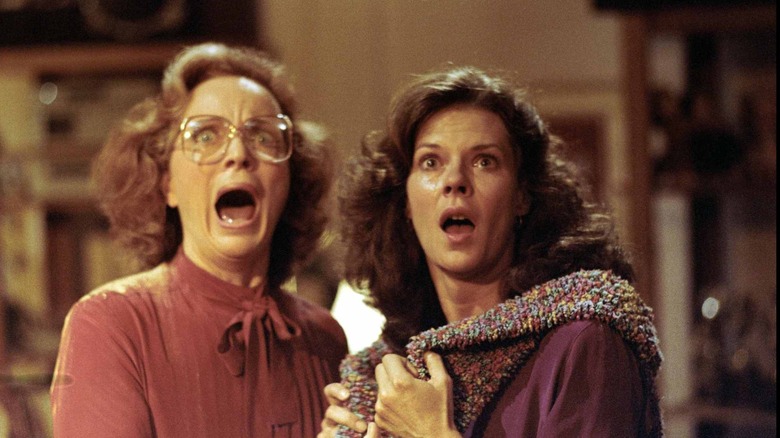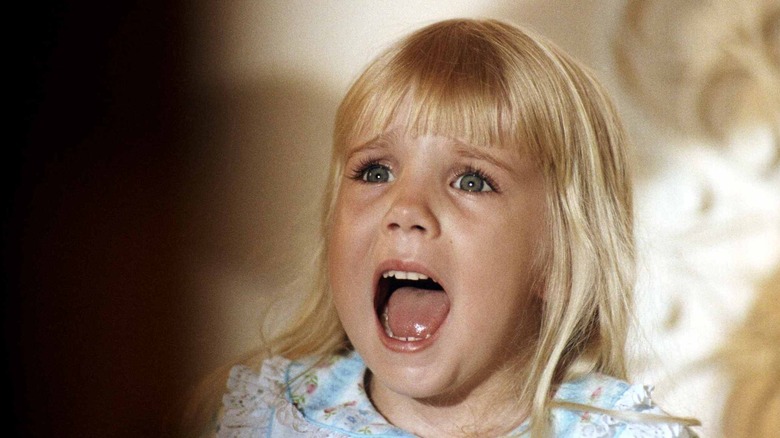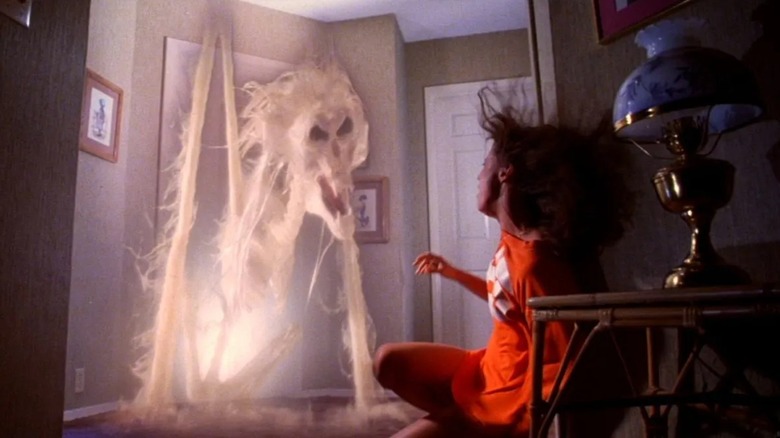Poltergeist: The Chilling True Story That Inspired The 1982 Horror Classic
In Tobe Hooper's "Poltergeist," five-year-old Carol Anne (Heather O'Rourke), the youngest in the Freeling family, points at the television static and participates in an inexplicable conversation with the screen. Carol Anne repeats this ritual the next night and ominously declares, "They're he-e-e-re" — this proclamation marks the beginning of the end for the Freelings, who are targeted and torn apart by the supernatural chaos that grips their home. The poltergeist activity that the Freelings endure ranges from benign to macabre, where things start off with bent or broken kitchenware and escalate to a sentient tree attempting to devour one or more family members.
From the perspective of spirit lore, poltergeists are known to be raucous entities who enjoy messing with furniture or pulling off mischievous pranks to annoy homeowners. In "Poltergeist," Hooper imbues these spirits with deeply malicious intent, where they prey on pure life forces and ambush innocents when they least expect it. While Hooper's taut direction and Steven Spielberg's gripping story helped elevate "Poltergeist" into a genuinely unnerving tale about a haunting, the true story that inspired the film feels even more surreal when one considers the account of Lucille Hermann, who had to contend with some severe poltergeist activity in her home in 1958.
Speaking to HuffPost, Hermann recounted her personal experience with poltergeists — which the 1982 film allegedly loosely drew from to cement its premise — and went into considerable detail about the haunting in a 2012 documentary titled "Real Fear: The Truth Behind the Movies." The documentary aimed at highlighting real-life paranormal experiences that inspired massive horror franchises like "Silent Hill" and "Amityville Horror," and Hermann happened to be one of many who contributed. Let's look into her story to try and understand what makes "Poltergeist" so viscerally frightening.
An unforgettable experience
Hermann kicked off the interview by stating that she had never seen the 1982 film, as she "had [her] own nightmare" to deal with over the years. Recounting the events of February 3, 1958, Hermann explained how her mother had called her father, James, after she and her brother, Jimmy, heard popping sounds emanating from various points in the house:
"All of a sudden, you'd hear this loud noise, like a popping bottle sound, and you'd look around and find a bottle that was 12 feet away from where it was supposed to be and all the contents were missing and the bottle was hot to the touch."
As this event seemed harmless, James decided to stay calm and tried to figure out whether this was a prank by teenagers who lived nearby. However, the next day, the family saw bottles move inexplicably through the air, and even after the police were called, these poppings increased and began to increase in intensity. Scientific reasons, such as electronic disturbances and the like were allegedly ruled out, and a priest was brought in to bless the home soon after.
An article in Life Magazine popularized the news of the haunting, attracting attention from conspiracy theorists and paranormal experts, who wrote letters to the Hermanns and offered their take on what might have been occurring. A parapsychologist approached them and deduced that the hauntings might have something to do with the presence of their children (who are believed to attract such entities) and the activities ceased after the hauntings were studied and recorded by this expert and his colleagues. While there are no clear answers about what happened, the Hermann incident allowed the word "poltergeist" to bask under a spotlight that was both unnerving and intriguing at the same time.
How did Poltergeist shape its terrifying core?
While Hermann's personal experience is creepy (and surely distressing for a family who had just moved in), the events that plagued the cast and crew of "Poltergeist" are decidedly unnerving for various reasons. Innumerable written investigations have been conducted about the apparent "curse" that clung to the filming process — whether these speculations are true is a matter of perspective, and it is best to approach this with a grain of salt. However, what truly makes "Poltergeist" so fascinating is its commitment to elevating a fairly-harmless spirit lore into something that actively breaks the sanctity associated with family units and the utopia of suburban living.
The film also delves deeper into parapsychology, lending some credit to the notion of the afterlife through the words of Tangina Barrons (Zelda May Rubinstein), who explains that death is not a finality, but a transference to a different sphere of consciousness. The poltergeists who are hell-bent on harassing the Freelings are spirits trapped in limbo, attracted to the life force of adolescents as it grants them some sort of power. There are layers of dubious psychosexuality to parse here, which only intensifies the sense of uncomfortable dread after Carol Anne goes missing in the film. As the home television remains a portal of communication even after this point, our tense relationship with technology takes on a more macabre meaning.
Almost 40 years later, "Poltergeist" still manages to feel frightening enough, even without the chilling real-life context that Hermann provides above. However, Hermann's tale adds to the unsettling feeling of being perceived in one's own home and jolted out of one's comfort zone in a way that evades satisfactory explanation. After all, some mysteries are best left unsolved.


